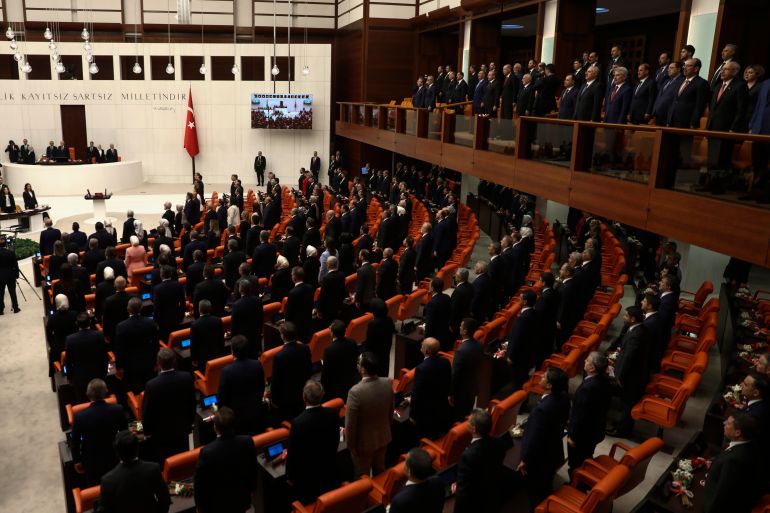Who’s running to lead Turkey’s next parliament?
Incumbent President Erdogan’s alliance secured a majority in the 600-seat parliament, which is now electing its head.

After tense presidential and parliamentary elections, voting is now under way to elect the next head of the Turkish parliament.
Members of parliament will decide who will lead Turkey’s Grand National Assembly (TBMM) in its 28th period, where the alliance for President Recep Tayyip Erdogan has secured a majority.
Who’s running?
Several heavyweight politicians and economists, including Istanbul representatives, have thrown their hats in the ring.
Numan Kurtulmus, an AK Party (Justice and Development Party) Istanbul representative and its deputy chairman, is the candidate for Erdogan’s party as well as the nationalist MHP (Nationalist Movement Party).
Kurtulmus was deputy prime minister of Turkey between 2014 and 2017 and minister of culture and tourism between 2017 and 2018.
The candidate for the social democratic CHP (Republican People’s Party) is Tekin Bingol, a current Ankara representative and deputy leader of the party since 2014.
Adana representative Tulay Hatimogullari is the left-wing YSP’s (Green Left Party) candidate. She is an economist who served as co-chairman of the YSP between 2016 and 2018.
Economist and banker Mustafa Cihan Pacaci, another Istanbul representative, is IYI Party’s (the Good Party) candidate. Pacaci was deputy general manager at Sekerbank and chairman and general director at several major Turkish banks, including Etibank, Halkbank and Ziraat Bank.
DEVA Party’s (Democracy and Progress Party) candidate, Mustafa Yeneroglu, is a lawyer and a representative for Istanbul.
Yeneroglu was a member of the AK Party, where he was an Istanbul representative and a member of their central decision-making and executive board between 2017 and 2018. He resigned in 2019 and joined DEVA a year later.
The Future Party has chosen Antalya representative Serap Yazici Ozbudun, a constitutional law professor, as its candidate.
TIP’s (Workers’ Party of Turkey) candidate and Hatay representative Serafettin Can Atalay is an imprisoned lawyer and activist. He was sentenced to 18 years in relation to the Gezi Park anti-government protests in 2013. His candidacy was submitted by TIP head Erkan Bas on his behalf.
How does voting work?
Candidates were given five days from June 2 to put their names forward for the position of parliament chief who presides over the 600-member Grand National Assembly.
Parties officially informed the parliament of their selections by Tuesday, and voting started on Wednesday at 2pm.
A candidate can secure the presidency during the first round of voting if they win at least 400 votes. The voting will proceed to another 400-vote minimum round if no one succeeds in the first round.
If extended to a third round, a majority of 301 votes will determine who will ascend to the position. In case no candidate gets this majority, the two candidates with the most votes will move to the fourth round, where eventually the candidate with the highest number of votes will become parliament chief.
What’s the backdrop?
The race for the presidency of Turkey’s parliament comes days after Erdogan took his oath as president after emerging victorious in a historic run-off election that extended his two-decade rule for another five years.
The 69-year-old remains at the helm, with a new cabinet, and will have to contend with an intense economic crisis made worse in the aftermath of a devastating earthquake that killed more than 50,000 people.
His 52.2 percent victory over rival Kemal Kilicdaroglu with 47.8 percent came after the May 14 parliamentary elections gave his alliance a majority.
Erdogan’s AK Party has 268 seats in parliament, followed by CHP with 169 representatives.